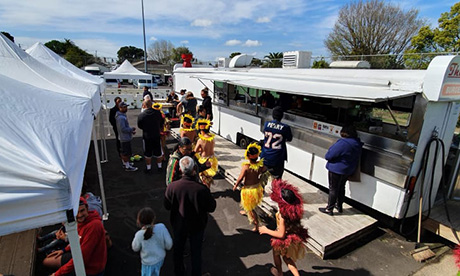Fast food happened fast.
The golden arches were first sighted in Porirua in 1976. Just 20 years later, there were 100 McDonald’s restaurants in the country. Nowadays, fast food restaurants are an omnipresent feature of the landscape of urban New Zealand.
Kiwis flocked to the cities in the latter half of the 20th century, and as we moved, so too did the source of our lunch and dinner.
New Zealand has the third-highest adult obesity rate in the OECD, and rates continue to increase – yet in many of New Zealand’s most socially disadvantaged suburbs, fast food and other unhealthy options are often the only pick on the menu.
Children living in deprived neighbourhoods are almost three times as likely to be obese compared to those living in more affluent areas, according to the New Zealand Health Survey.
The Government has taken a broad approach, focusing on messages of nutrition and increased physical activity.
But researchers from Auckland University of Technology say the answer lies in building food havens – places with food that is culturally accessible, affordable and desirable, found on a family, community or local business level.
“… Healthy eating campaigns that ignore the cultural meaning of food may miss their target audience, and there should be more focus on promoting healthy food that people in communities over-represented in obesity feel connected to.”
The need for food havens first occurred to public health researcher Dr Radilaite Cammock when she was trying to find groceries for her kids in her South Auckland neighbourhood.
“The idea came to mind when trying to find a healthy market to give my kids’ food,” she said. “I couldn’t find anywhere good close to where I live.”
Cammock says change needs to come from empowering communities rather than expecting the big corporations to do a sudden U-turn on providing healthy food.
“If you look to the big food organisations to change, you miss some great stuff that can change in the community,” she said. “We’ve spoken to young entrepreneurs who are trying to sell healthy food with a cultural connection.”
In South Auckland, enterprises like Papatoetoe Food Hub and Ōtara Kai Village have been providing healthy and affordable kai with a focus on culture and community.
Developed by the Southern Initiative, Papatoetoe Food Hub wants to build supply and demand for good food in South Auckland.
Since July 2019, they’ve repurposed around 300kg of unused produce a week – some from Papatuanuku Marae and Pukekohe farmers – but mainly from the New World across the road.
Bin says they may be the only business in New Zealand based on rescuing food.
“It’s a whole cycle. Our food waste goes into compost, which we then use in planter boxes where we grow our own food. We’ve been composting about 100kg a week.”
They hope to be part of shifting South Auckland’s dependency on fast food. Continue reading
- Image: Newsroom
News category: Analysis and Comment.




